An Analysis of Catholic Social Thought: Principles and Themes
VerifiedAdded on 2023/01/13
|5
|1413
|64
Essay
AI Summary
This essay delves into the multifaceted realm of Catholic Social Thought, elucidating its definition and core principles. It begins by defining Catholic Social Teaching, tracing its origins from Pope Leo XIII's Rerum Novarum to Pope Benedict XVI's Deus Caritas est, and highlighting the significance of papal encyclicals, conciliar documents, and U.S. bishops' conferences. The essay then explores the central themes of Catholic Social Thought, including human dignity, emphasizing the importance of respecting the spiritual worth of each individual; the common good, which promotes social conditions that enable individuals and groups to flourish; solidarity, which underscores the interconnectedness of all people and advocates for social justice; and human rights and responsibilities, which stress the protection of fundamental rights and the importance of moral behavior. The essay concludes by emphasizing the relevance of these principles in contemporary society, advocating for a communal approach to life and the importance of just legal practices.
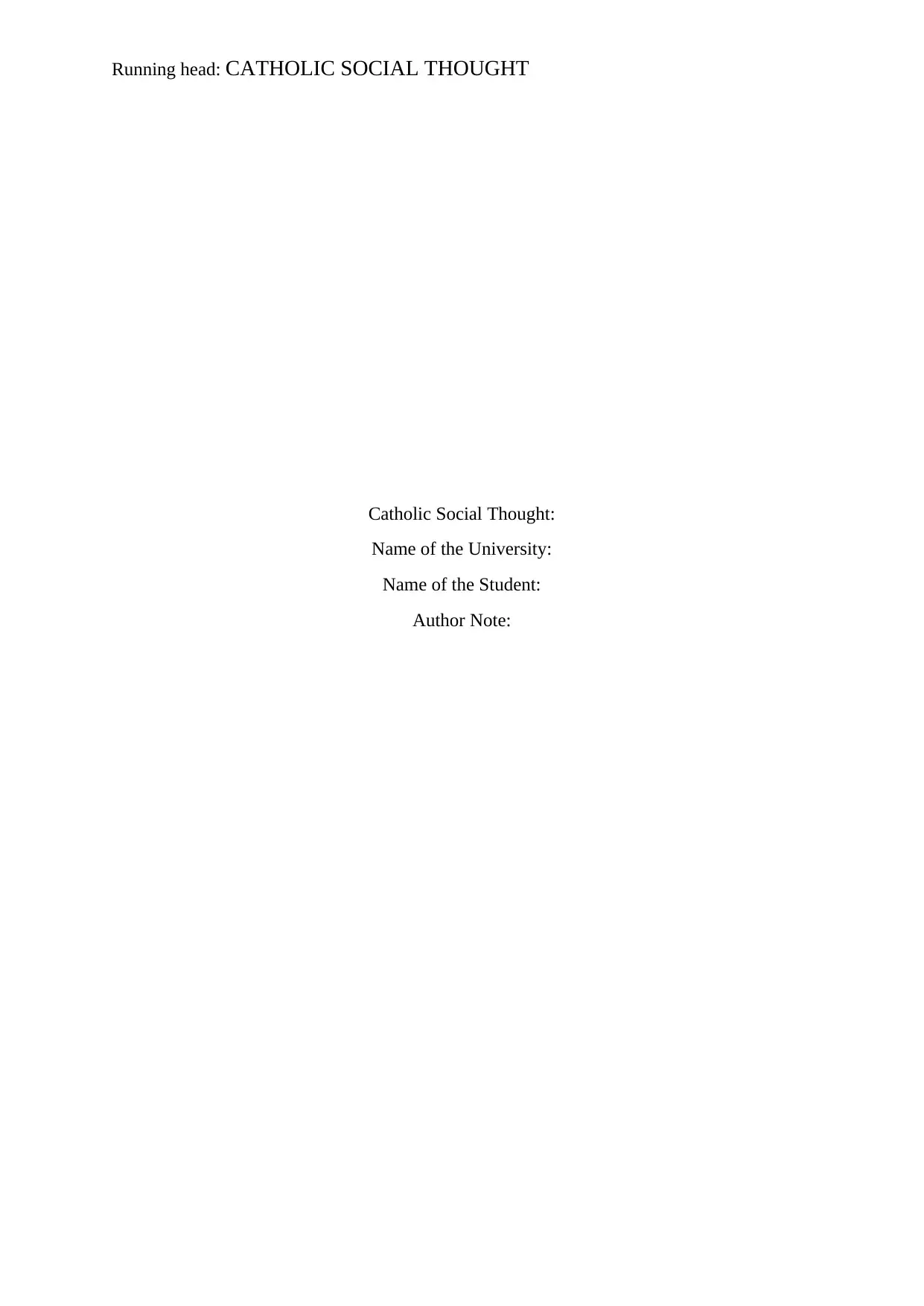
Running head: CATHOLIC SOCIAL THOUGHT
Catholic Social Thought:
Name of the University:
Name of the Student:
Author Note:
Catholic Social Thought:
Name of the University:
Name of the Student:
Author Note:
Paraphrase This Document
Need a fresh take? Get an instant paraphrase of this document with our AI Paraphraser
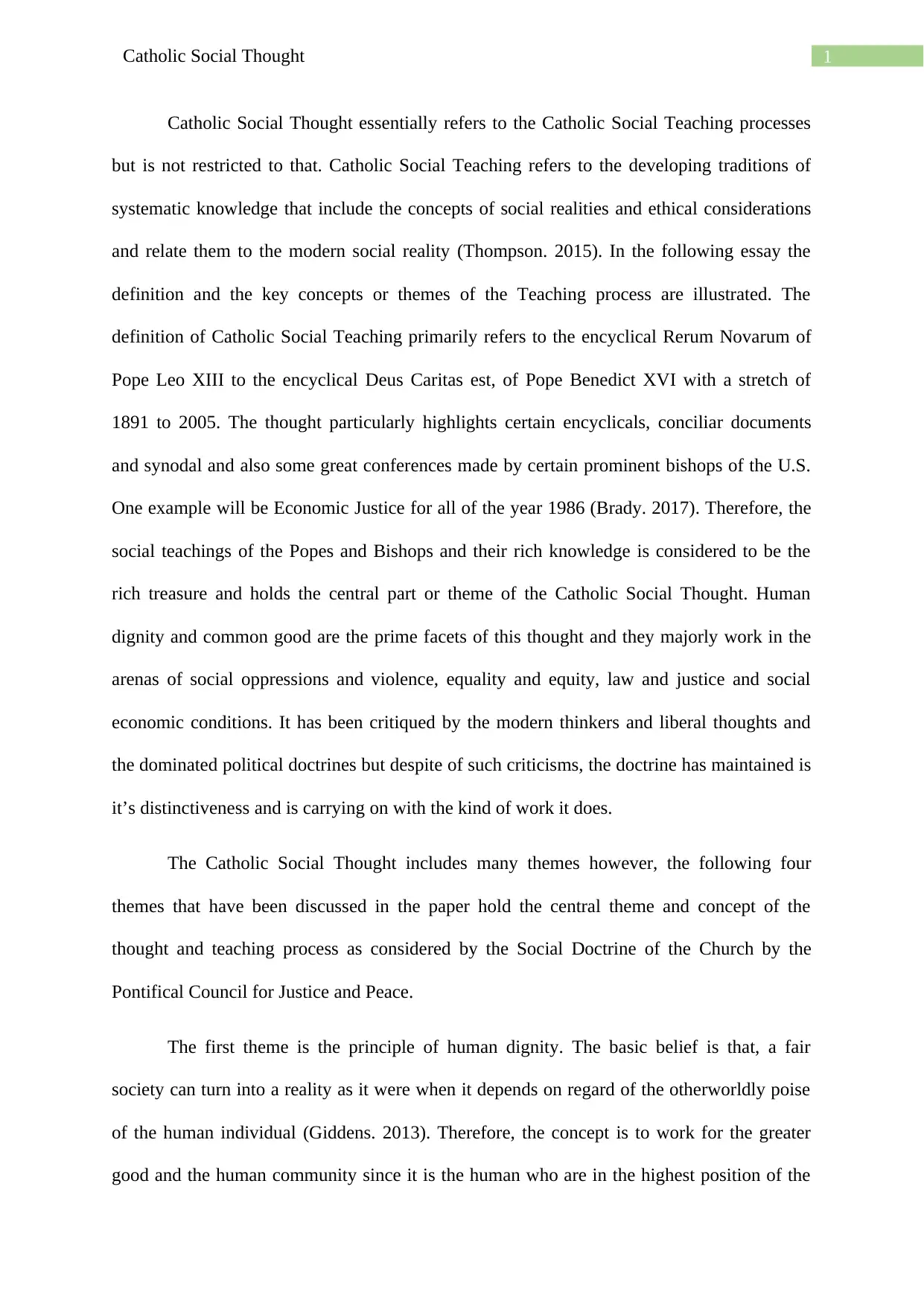
1Catholic Social Thought
Catholic Social Thought essentially refers to the Catholic Social Teaching processes
but is not restricted to that. Catholic Social Teaching refers to the developing traditions of
systematic knowledge that include the concepts of social realities and ethical considerations
and relate them to the modern social reality (Thompson. 2015). In the following essay the
definition and the key concepts or themes of the Teaching process are illustrated. The
definition of Catholic Social Teaching primarily refers to the encyclical Rerum Novarum of
Pope Leo XIII to the encyclical Deus Caritas est, of Pope Benedict XVI with a stretch of
1891 to 2005. The thought particularly highlights certain encyclicals, conciliar documents
and synodal and also some great conferences made by certain prominent bishops of the U.S.
One example will be Economic Justice for all of the year 1986 (Brady. 2017). Therefore, the
social teachings of the Popes and Bishops and their rich knowledge is considered to be the
rich treasure and holds the central part or theme of the Catholic Social Thought. Human
dignity and common good are the prime facets of this thought and they majorly work in the
arenas of social oppressions and violence, equality and equity, law and justice and social
economic conditions. It has been critiqued by the modern thinkers and liberal thoughts and
the dominated political doctrines but despite of such criticisms, the doctrine has maintained is
it’s distinctiveness and is carrying on with the kind of work it does.
The Catholic Social Thought includes many themes however, the following four
themes that have been discussed in the paper hold the central theme and concept of the
thought and teaching process as considered by the Social Doctrine of the Church by the
Pontifical Council for Justice and Peace.
The first theme is the principle of human dignity. The basic belief is that, a fair
society can turn into a reality as it were when it depends on regard of the otherworldly poise
of the human individual (Giddens. 2013). Therefore, the concept is to work for the greater
good and the human community since it is the human who are in the highest position of the
Catholic Social Thought essentially refers to the Catholic Social Teaching processes
but is not restricted to that. Catholic Social Teaching refers to the developing traditions of
systematic knowledge that include the concepts of social realities and ethical considerations
and relate them to the modern social reality (Thompson. 2015). In the following essay the
definition and the key concepts or themes of the Teaching process are illustrated. The
definition of Catholic Social Teaching primarily refers to the encyclical Rerum Novarum of
Pope Leo XIII to the encyclical Deus Caritas est, of Pope Benedict XVI with a stretch of
1891 to 2005. The thought particularly highlights certain encyclicals, conciliar documents
and synodal and also some great conferences made by certain prominent bishops of the U.S.
One example will be Economic Justice for all of the year 1986 (Brady. 2017). Therefore, the
social teachings of the Popes and Bishops and their rich knowledge is considered to be the
rich treasure and holds the central part or theme of the Catholic Social Thought. Human
dignity and common good are the prime facets of this thought and they majorly work in the
arenas of social oppressions and violence, equality and equity, law and justice and social
economic conditions. It has been critiqued by the modern thinkers and liberal thoughts and
the dominated political doctrines but despite of such criticisms, the doctrine has maintained is
it’s distinctiveness and is carrying on with the kind of work it does.
The Catholic Social Thought includes many themes however, the following four
themes that have been discussed in the paper hold the central theme and concept of the
thought and teaching process as considered by the Social Doctrine of the Church by the
Pontifical Council for Justice and Peace.
The first theme is the principle of human dignity. The basic belief is that, a fair
society can turn into a reality as it were when it depends on regard of the otherworldly poise
of the human individual (Giddens. 2013). Therefore, the concept is to work for the greater
good and the human community since it is the human who are in the highest position of the
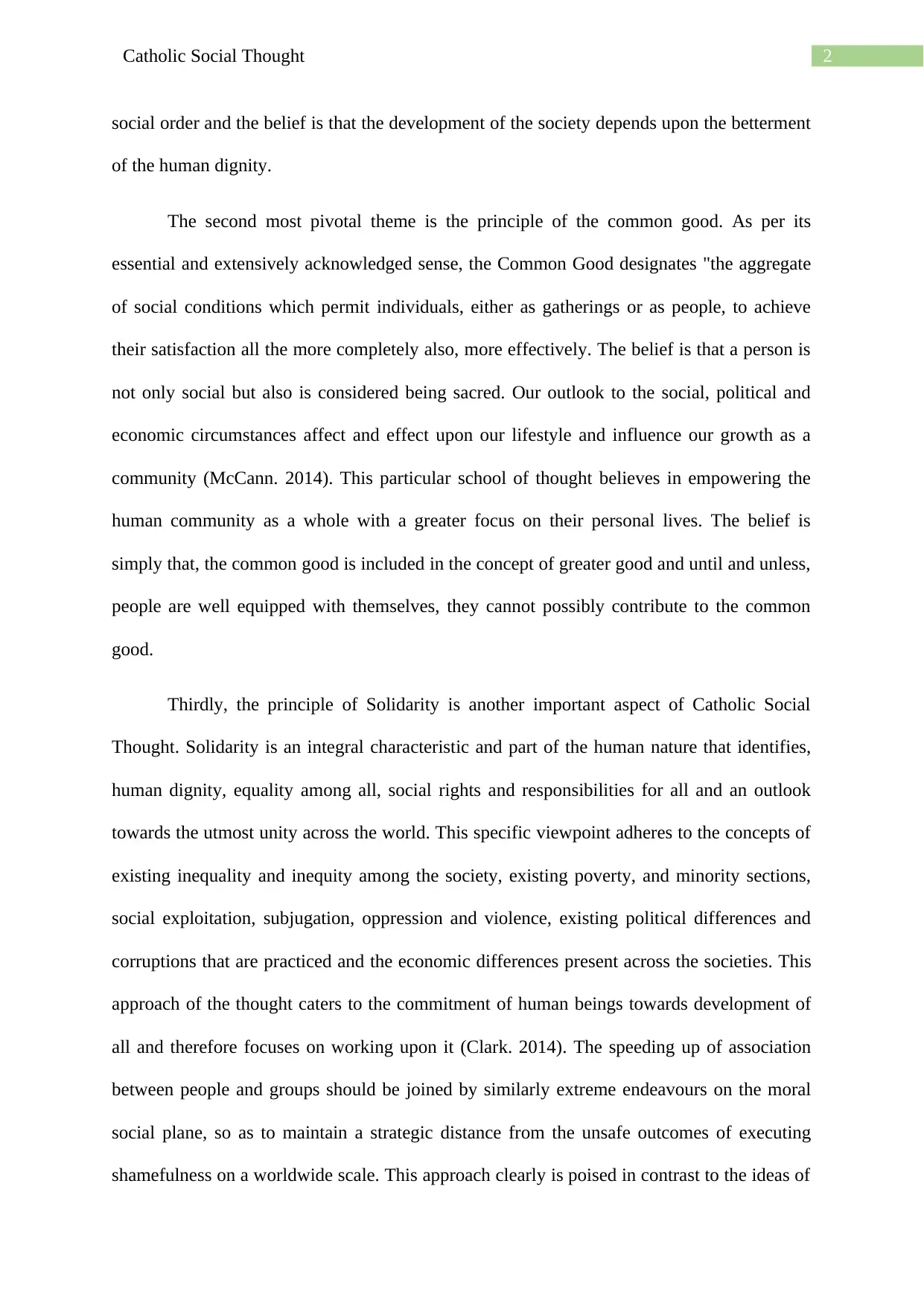
2Catholic Social Thought
social order and the belief is that the development of the society depends upon the betterment
of the human dignity.
The second most pivotal theme is the principle of the common good. As per its
essential and extensively acknowledged sense, the Common Good designates "the aggregate
of social conditions which permit individuals, either as gatherings or as people, to achieve
their satisfaction all the more completely also, more effectively. The belief is that a person is
not only social but also is considered being sacred. Our outlook to the social, political and
economic circumstances affect and effect upon our lifestyle and influence our growth as a
community (McCann. 2014). This particular school of thought believes in empowering the
human community as a whole with a greater focus on their personal lives. The belief is
simply that, the common good is included in the concept of greater good and until and unless,
people are well equipped with themselves, they cannot possibly contribute to the common
good.
Thirdly, the principle of Solidarity is another important aspect of Catholic Social
Thought. Solidarity is an integral characteristic and part of the human nature that identifies,
human dignity, equality among all, social rights and responsibilities for all and an outlook
towards the utmost unity across the world. This specific viewpoint adheres to the concepts of
existing inequality and inequity among the society, existing poverty, and minority sections,
social exploitation, subjugation, oppression and violence, existing political differences and
corruptions that are practiced and the economic differences present across the societies. This
approach of the thought caters to the commitment of human beings towards development of
all and therefore focuses on working upon it (Clark. 2014). The speeding up of association
between people and groups should be joined by similarly extreme endeavours on the moral
social plane, so as to maintain a strategic distance from the unsafe outcomes of executing
shamefulness on a worldwide scale. This approach clearly is poised in contrast to the ideas of
social order and the belief is that the development of the society depends upon the betterment
of the human dignity.
The second most pivotal theme is the principle of the common good. As per its
essential and extensively acknowledged sense, the Common Good designates "the aggregate
of social conditions which permit individuals, either as gatherings or as people, to achieve
their satisfaction all the more completely also, more effectively. The belief is that a person is
not only social but also is considered being sacred. Our outlook to the social, political and
economic circumstances affect and effect upon our lifestyle and influence our growth as a
community (McCann. 2014). This particular school of thought believes in empowering the
human community as a whole with a greater focus on their personal lives. The belief is
simply that, the common good is included in the concept of greater good and until and unless,
people are well equipped with themselves, they cannot possibly contribute to the common
good.
Thirdly, the principle of Solidarity is another important aspect of Catholic Social
Thought. Solidarity is an integral characteristic and part of the human nature that identifies,
human dignity, equality among all, social rights and responsibilities for all and an outlook
towards the utmost unity across the world. This specific viewpoint adheres to the concepts of
existing inequality and inequity among the society, existing poverty, and minority sections,
social exploitation, subjugation, oppression and violence, existing political differences and
corruptions that are practiced and the economic differences present across the societies. This
approach of the thought caters to the commitment of human beings towards development of
all and therefore focuses on working upon it (Clark. 2014). The speeding up of association
between people and groups should be joined by similarly extreme endeavours on the moral
social plane, so as to maintain a strategic distance from the unsafe outcomes of executing
shamefulness on a worldwide scale. This approach clearly is poised in contrast to the ideas of
⊘ This is a preview!⊘
Do you want full access?
Subscribe today to unlock all pages.

Trusted by 1+ million students worldwide
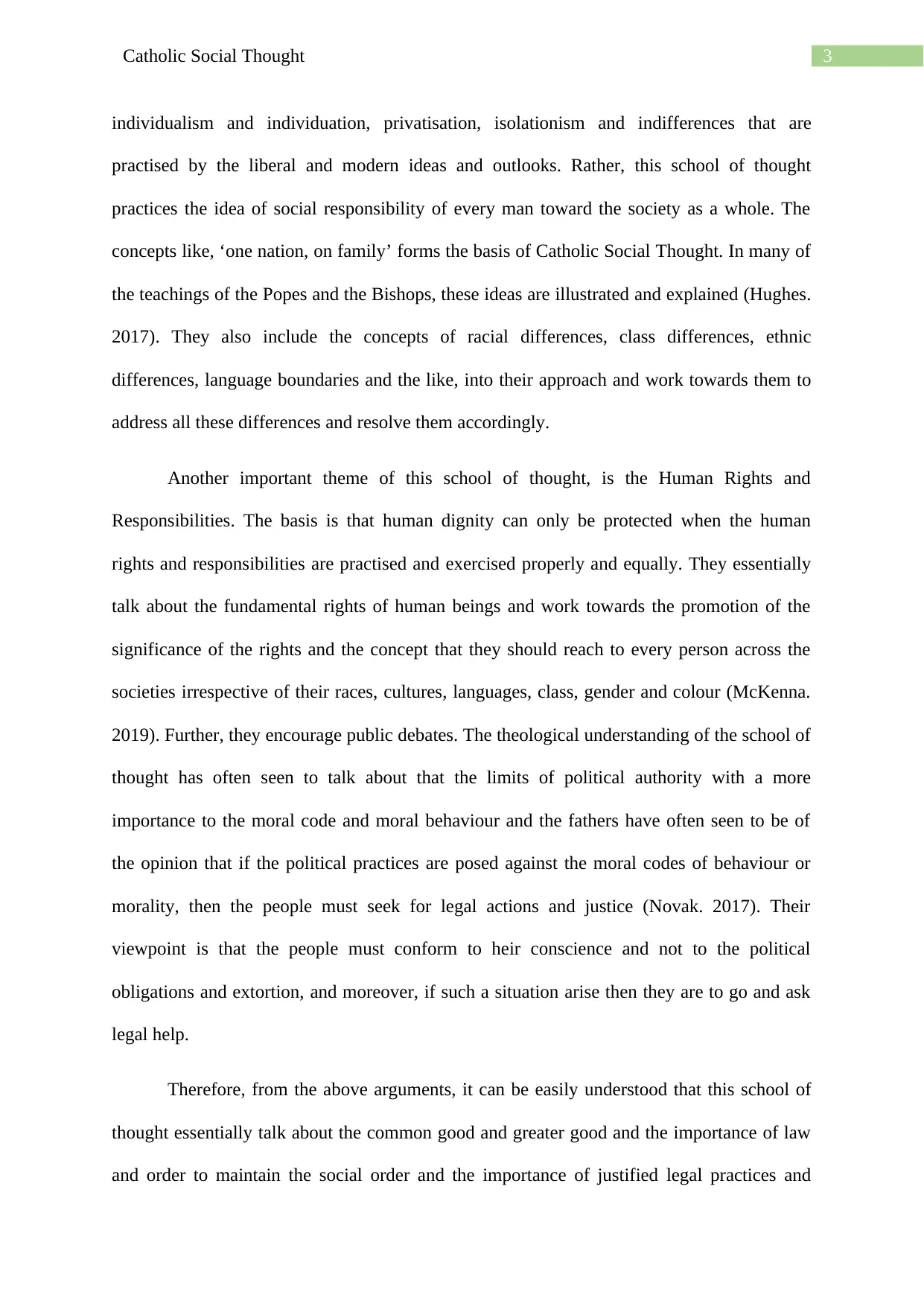
3Catholic Social Thought
individualism and individuation, privatisation, isolationism and indifferences that are
practised by the liberal and modern ideas and outlooks. Rather, this school of thought
practices the idea of social responsibility of every man toward the society as a whole. The
concepts like, ‘one nation, on family’ forms the basis of Catholic Social Thought. In many of
the teachings of the Popes and the Bishops, these ideas are illustrated and explained (Hughes.
2017). They also include the concepts of racial differences, class differences, ethnic
differences, language boundaries and the like, into their approach and work towards them to
address all these differences and resolve them accordingly.
Another important theme of this school of thought, is the Human Rights and
Responsibilities. The basis is that human dignity can only be protected when the human
rights and responsibilities are practised and exercised properly and equally. They essentially
talk about the fundamental rights of human beings and work towards the promotion of the
significance of the rights and the concept that they should reach to every person across the
societies irrespective of their races, cultures, languages, class, gender and colour (McKenna.
2019). Further, they encourage public debates. The theological understanding of the school of
thought has often seen to talk about that the limits of political authority with a more
importance to the moral code and moral behaviour and the fathers have often seen to be of
the opinion that if the political practices are posed against the moral codes of behaviour or
morality, then the people must seek for legal actions and justice (Novak. 2017). Their
viewpoint is that the people must conform to heir conscience and not to the political
obligations and extortion, and moreover, if such a situation arise then they are to go and ask
legal help.
Therefore, from the above arguments, it can be easily understood that this school of
thought essentially talk about the common good and greater good and the importance of law
and order to maintain the social order and the importance of justified legal practices and
individualism and individuation, privatisation, isolationism and indifferences that are
practised by the liberal and modern ideas and outlooks. Rather, this school of thought
practices the idea of social responsibility of every man toward the society as a whole. The
concepts like, ‘one nation, on family’ forms the basis of Catholic Social Thought. In many of
the teachings of the Popes and the Bishops, these ideas are illustrated and explained (Hughes.
2017). They also include the concepts of racial differences, class differences, ethnic
differences, language boundaries and the like, into their approach and work towards them to
address all these differences and resolve them accordingly.
Another important theme of this school of thought, is the Human Rights and
Responsibilities. The basis is that human dignity can only be protected when the human
rights and responsibilities are practised and exercised properly and equally. They essentially
talk about the fundamental rights of human beings and work towards the promotion of the
significance of the rights and the concept that they should reach to every person across the
societies irrespective of their races, cultures, languages, class, gender and colour (McKenna.
2019). Further, they encourage public debates. The theological understanding of the school of
thought has often seen to talk about that the limits of political authority with a more
importance to the moral code and moral behaviour and the fathers have often seen to be of
the opinion that if the political practices are posed against the moral codes of behaviour or
morality, then the people must seek for legal actions and justice (Novak. 2017). Their
viewpoint is that the people must conform to heir conscience and not to the political
obligations and extortion, and moreover, if such a situation arise then they are to go and ask
legal help.
Therefore, from the above arguments, it can be easily understood that this school of
thought essentially talk about the common good and greater good and the importance of law
and order to maintain the social order and the importance of justified legal practices and
Paraphrase This Document
Need a fresh take? Get an instant paraphrase of this document with our AI Paraphraser
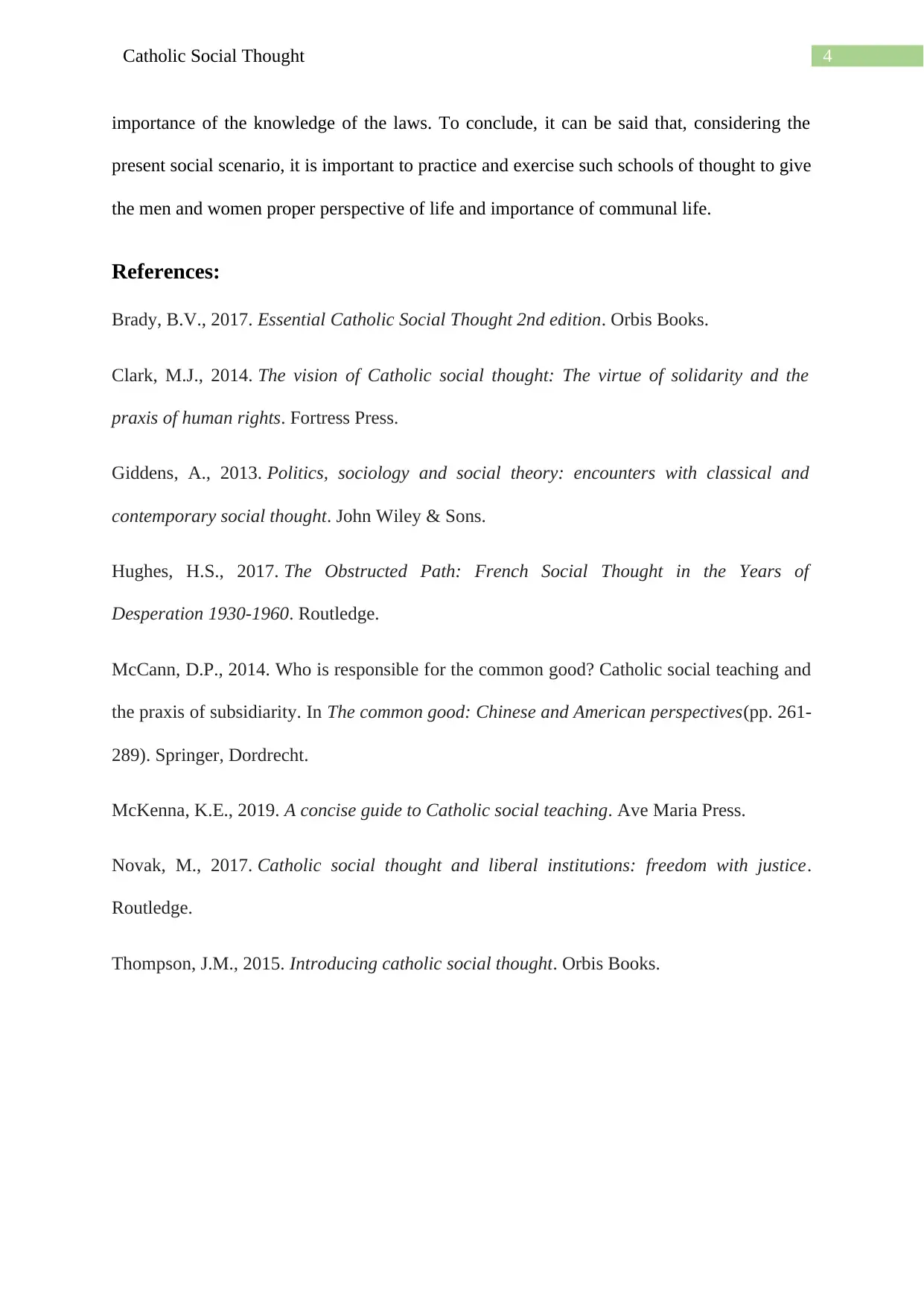
4Catholic Social Thought
importance of the knowledge of the laws. To conclude, it can be said that, considering the
present social scenario, it is important to practice and exercise such schools of thought to give
the men and women proper perspective of life and importance of communal life.
References:
Brady, B.V., 2017. Essential Catholic Social Thought 2nd edition. Orbis Books.
Clark, M.J., 2014. The vision of Catholic social thought: The virtue of solidarity and the
praxis of human rights. Fortress Press.
Giddens, A., 2013. Politics, sociology and social theory: encounters with classical and
contemporary social thought. John Wiley & Sons.
Hughes, H.S., 2017. The Obstructed Path: French Social Thought in the Years of
Desperation 1930-1960. Routledge.
McCann, D.P., 2014. Who is responsible for the common good? Catholic social teaching and
the praxis of subsidiarity. In The common good: Chinese and American perspectives(pp. 261-
289). Springer, Dordrecht.
McKenna, K.E., 2019. A concise guide to Catholic social teaching. Ave Maria Press.
Novak, M., 2017. Catholic social thought and liberal institutions: freedom with justice.
Routledge.
Thompson, J.M., 2015. Introducing catholic social thought. Orbis Books.
importance of the knowledge of the laws. To conclude, it can be said that, considering the
present social scenario, it is important to practice and exercise such schools of thought to give
the men and women proper perspective of life and importance of communal life.
References:
Brady, B.V., 2017. Essential Catholic Social Thought 2nd edition. Orbis Books.
Clark, M.J., 2014. The vision of Catholic social thought: The virtue of solidarity and the
praxis of human rights. Fortress Press.
Giddens, A., 2013. Politics, sociology and social theory: encounters with classical and
contemporary social thought. John Wiley & Sons.
Hughes, H.S., 2017. The Obstructed Path: French Social Thought in the Years of
Desperation 1930-1960. Routledge.
McCann, D.P., 2014. Who is responsible for the common good? Catholic social teaching and
the praxis of subsidiarity. In The common good: Chinese and American perspectives(pp. 261-
289). Springer, Dordrecht.
McKenna, K.E., 2019. A concise guide to Catholic social teaching. Ave Maria Press.
Novak, M., 2017. Catholic social thought and liberal institutions: freedom with justice.
Routledge.
Thompson, J.M., 2015. Introducing catholic social thought. Orbis Books.
1 out of 5
Related Documents
Your All-in-One AI-Powered Toolkit for Academic Success.
+13062052269
info@desklib.com
Available 24*7 on WhatsApp / Email
![[object Object]](/_next/static/media/star-bottom.7253800d.svg)
Unlock your academic potential
Copyright © 2020–2026 A2Z Services. All Rights Reserved. Developed and managed by ZUCOL.


